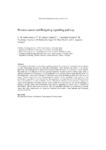Prostate cancer and Hedgehog signalling pathway

Ver/
Use este enlace para citar
http://hdl.handle.net/2183/18485Coleccións
- GI-TCMR - Artigos [129]
Metadatos
Mostrar o rexistro completo do ítemTítulo
Prostate cancer and Hedgehog signalling pathwayAutor(es)
Data
2007-08-02Cita bibliográfica
Antón Aparicio LM, García Campelo R, Casinello Espinosa J, et al. Prostate cancer and Hedgehog signalling pathway. Clin Transl Oncol. 2007;9:420-428
Resumo
[Abstract] The Hedgehog (Hh) family of intercellular signalling proteins have come to be recognised as key mediators in many fundamental processes in embryonic development. Their activities are central to the growth, patterning and morphogenesis of many different regions within the bodies of vertebrates. In some contexts, Hh signals act as morphogens in the dose-dependent induction of distinct cell fates within a target field, in others as mitogens in the regulation of cell proliferation or as inducing factors controlling the form of a developing organ. These diverse functions of Hh proteins raise many intriguing questions about their mode of action. Various studies have now demonstrated the function of Hh signalling in the control of cell proliferation, especially for stem cells and stem-like progenitors. Abnormal activation of the Hh pathway has been demonstrated in a variety of human tumours. Hh pathway activity in these tumours is required for cancer cell proliferation and tumour growth. Recent studies have uncovered the role for Hh signalling in advanced prostate cancer and demonstrated that autocrine signalling by tumour cells is required for proliferation, viability and invasive behaviour. Thus, Hh signalling represents a novel pathway in prostate cancer that offers opportunities for prognostic biomarker development, drug targeting and therapeutic response monitoring.
Palabras chave
Hh signalling
Prostate development
Tumorigenesis
Prostate cancer
Prostate development
Tumorigenesis
Prostate cancer
Versión do editor
Dereitos
The final publication is avaliable at Springer Link
ISSN
1699-048X
1699-3055
1699-3055





